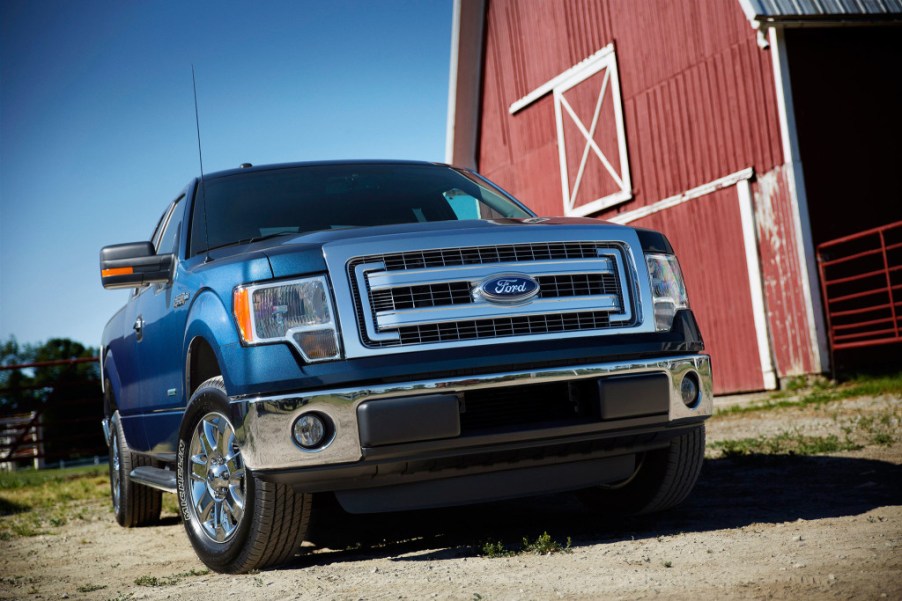
2014 Ford F-150: The Most Common Complaints You Should Know About
It’s no secret that the Ford F-150 has been the best-selling truck in America for over 40 consecutive years, and the F-Series line continues to grow with record-breaking sales. But not every model year is created equally. If you’re in the market for a used truck, then the 2014 Ford F-150 is a stout option, but there are things you need to know first.
Is the 2014 Ford F-150 model worth buying?

Yes, it is worth buying. The 2014 Ford F-150, in particular, was highly sought-after when it was new, and it remains a popular choice among pre-owned trucks today. It was the last model year from the 7th generation, so it started to show its age at the time.
It offers a 3.5-liter turbocharged EcoBoost V6 engine, which is a reliable choice that’s still used today, premium available features such as a power moonroof and dual-zone automatic climate control, and excellent safety ratings from both the NHTSA and the IIHS.
The 2014 F-150 can tow up to 13,500 lbs and carry a payload of up to 2,445 lbs. It’s still stronger than some rivals today. For example, the 2023 Toyota Tundra can tow up to 12,000 lbs and can only carry a payload of up to 1,940 lbs.
But as great as the 2014 F-150 may seem, it’s not perfect. Previous owners have shared their experiences to shed light on potential issues.
2014 F-150 climate control system issues
A substantial number of 2014 Ford F-150 owners have reported issues with the trucks’ in-cabin climate system. The problems cited specifically mention the blower motor only working when turned to high speed and the fan speed changing constantly while driving, despite being untouched.
Other issues include the climate control system simultaneously blowing hot air on one side of the truck and cold on the other or the climate system simply failing to work at all.
Although a recall was never issued for problems related to the trucks’ climate systems, the complaints are very well-documented in owners’ forums online.
The 2014 F-150 infotainment system is wonky
There was a widely known issue with the touchscreen infotainment systems in 2014 Ford F-150 models. It affected music playback, the backup camera, GPS navigation, and Bluetooth pairing, among other problems.
The display screen would reportedly sometimes go completely black, freeze up, or not shut down when the truck was turned off. Some owners reported having to open and close the doors or turn the key on and off in the ignition to get the system up and running again.
It’s worth noting that Ford completely overhauled its in-vehicle connectivity systems at the end of 2014. The company announced it was replacing its Microsoft-powered MyFord Touch infotainment system with the BlackBerry QNX-based Sync system in December of that year. It makes perfect sense that 2014 F-150 owners report so many problems with the system.
The Ford F-150’s brakes may need work

After a number of drivers’ reports about a complete loss of brake functionality, Ford issued a recall in 2016 for over 270,000 2013 and 2014 F-150s.
Faulty master brake cylinders caused fluid loss that resulted in a loss of brake power, particularly at the front wheels. The recall applied primarily to trucks with the base model V6 engine.
Ford actually issued another brake-related recall in late 2014. This one was for brake lights that either did not illuminate whatsoever or did so after a substantial delay caused by an improperly adjusted brake pedal switch. The brake light issue fortunately only affected about 600 trucks.
F-150 electronic power steering issues
A number of engine issues plagued the 2014 Ford F-150, including a problem with the Electronic Power-Assisted Steering (EPAS).
Approximately 5,675 trucks were recalled in June 2014 because of an incorrectly installed motor position sensor magnet.
The faulty sensor magnet could cause power loss to the entire electronic power steering system, resulting in erratic or uncontrollable steering.
However, it’s worth noting that the recall corrected this problem at no cost to owners. It’s most likely no longer an issue among used Ford F-150 models.





